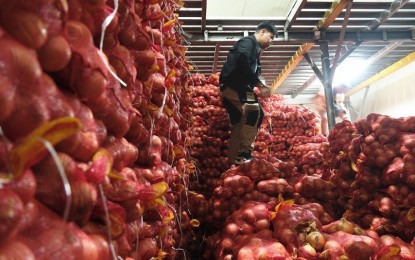
TAINTED. Over 300 tons of smuggled white onions, carrots, tomatoes, and other agricultural commodities are seized during a joint raid by the Department of Agriculture and the Bureau of Customs in two illegal warehouses in Navotas City on Aug. 15, 2024. The Bureau of Plant Industry on Friday (Sept. 6, 2024) said the seized products have tested positive for pesticides, heavy metals, and other microbial residue that are harmful to humans. (Photo courtesy of DA)
MANILA – The Bureau of Plant Industry (BPI) said Friday that the smuggled vegetables previously seized in Navotas tested positive for pesticides and heavy metals.
Over 300 tons of white onions, carrots, tomatoes and enoki mushrooms were confiscated from makeshift cold storage facilities and a 40-footer container van in mid-August due to lack of sanitary and phytosanitary import clearances (SPSIC) for importation.
“The food safety analysis confirms that the allegedly smuggled crops contain pesticide residues, heavy metals, and microbiological contaminants that do not comply with our food safety regulations,” BPI Director Gerald Glenn Panganiban said in a statement.
In particular, Panganiban said they tested positive for various pesticide residues which are “harmful to humans,” including organophosphates, organochlorines, and pyrethroids, as well as heavy metals like cadmium and lead.
Microbial contaminants are also present including E. coli, Listeria monocytogenes, and Salmonella spp, he added.
Department of Agriculture (DA) Secretary Francisco Tiu Laurel Jr., meanwhile, assured that the vegetables seized by the agency and Bureau of Customs will neither be sold nor donated.
“We cannot risk the health of Filipino consumers. The DA legal team will determine legal actions that can be taken against these unscrupulous traders who not only evaded tariffs but also endangered consumer health,” he said in another statement. (PNA)
